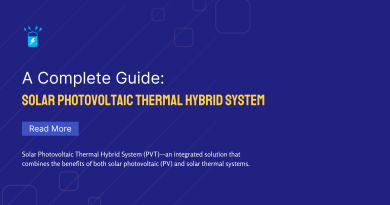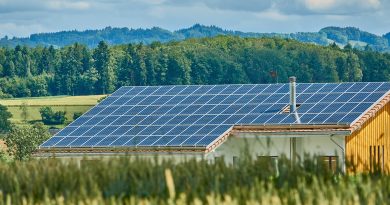What Is Open Circuit Voltage In Solar Panel?
Open-circuit voltage (Voc) is a critical parameter in solar panel performance, affecting system design, efficiency, and overall energy production. Understanding Voc, how it’s measured, and its relationship with other solar panel parameters is essential for optimizing solar energy systems. This guide explores Voc in detail, discussing its significance, the factors that influence it, and its practical applications in the solar industry.
Table of Contents
- 1 The Concept of Open-Circuit Voltage and Its Measurement
- 1.1 Measurement:
- 1.2 The Role of Voc in Solar Panel Characterization
- 1.3 The Relationship Between Voc, Isc, and MPP
- 1.4 Factors Affecting Voc and Its Impact on Solar Panel Performance
- 1.5 The Importance of Voc in System Design and Sizing
- 1.6 Troubleshooting Solar Panels Based on Voc Measurements
- 1.7 The Future of Solar Panel Technology and Its Impact on Voc
- 1.8 Common Misconceptions About Open-Circuit Voltage
- 1.9 Practical Applications of Voc in the Solar Industry
- 1.10 Impact of Temperature on Voc
- 1.11 Conclusion
- 1.12 FAQs
The Concept of Open-Circuit Voltage and Its Measurement
Open-circuit voltage (Voc) is the maximum voltage a solar panel can produce when it is not connected to a load or operating circuit. It represents the potential difference between the positive and negative terminals of the panel under open-circuit conditions.
Measurement:
- Voc Measurement: Voc is measured using a multimeter by connecting it to the solar panel’s terminals while the panel is exposed to sunlight but not connected to any load.
- Typical Values: For a standard 60-cell solar panel, Voc typically ranges from 30V to 40V.
The Role of Voc in Solar Panel Characterization
Voc is a key parameter in characterizing solar panels and understanding their electrical behavior. It is used to determine the panel’s maximum potential and is crucial for system design and optimization.
Example:
- Voc in Data Sheets: Manufacturers list Voc on the solar panel data sheet, indicating the panel’s maximum voltage under ideal conditions.
The Relationship Between Voc, Isc, and MPP
Voc is closely related to other important parameters like short-circuit current (Isc) and the maximum power point (MPP).
| Parameter | Description | Relationship with Voc |
|---|---|---|
| Short-Circuit Current (Isc) | The current when the panel’s terminals are shorted. | Voc and Isc are inversely related; as Voc increases, Isc decreases slightly. |
| Maximum Power Point (MPP) | The point where the product of voltage and current is maximum. | Voc is higher than the voltage at MPP (Vmp), but they are related in determining maximum power output. |
Factors Affecting Voc and Its Impact on Solar Panel Performance
Voc is influenced by several factors, which can impact the overall performance of a solar panel system.
| Factor | Impact on Voc |
|---|---|
| Temperature | Voc decreases with increasing temperature. |
| Solar Irradiance | Higher irradiance increases Isc but has a minimal effect on Voc. |
| Panel Degradation | Over time, panels may experience a slight reduction in Voc. |
Example:
- Temperature Coefficient: For every degree Celsius increase in temperature, Voc decreases by approximately 0.3% to 0.5%.
The Importance of Voc in System Design and Sizing
Voc is critical in the design and sizing of solar panel systems, particularly when determining the number of panels in a string and the selection of inverters.
Practical Considerations:
- String Sizing: Ensure the total Voc of the string does not exceed the inverter’s maximum input voltage.
- Safety Margin: Include a safety margin for cold weather conditions where Voc increases.
Troubleshooting Solar Panels Based on Voc Measurements
Voc measurements are valuable for troubleshooting solar panel systems, as they can help identify issues such as shading, panel damage, or connection problems.
Troubleshooting Steps:
- Measure Voc: Compare the measured Voc to the expected value.
- Check for Consistency: Inconsistent Voc readings across panels may indicate shading or a faulty panel.
- Inspect Connections: Loose or corroded connections can lead to reduced Voc.
The Future of Solar Panel Technology and Its Impact on Voc
Advances in solar technology are expected to affect Voc values, potentially leading to higher efficiency panels with optimized voltage characteristics.
Emerging Trends:
- Bifacial Panels: These panels may have different Voc characteristics due to their ability to capture light from both sides.
- Perovskite Solar Cells: New materials could lead to higher Voc values, improving overall system efficiency.
Common Misconceptions About Open-Circuit Voltage
There are several misconceptions about Voc that need clarification.
| Misconception | Clarification |
|---|---|
| Voc Equals Operating Voltage | Voc is the maximum possible voltage, not the operating voltage. |
| Higher Voc Means Better Performance | A higher Voc does not necessarily mean better overall performance. Efficiency and power output depend on multiple factors. |
Practical Applications of Voc in the Solar Industry
Understanding Voc is crucial for various applications in the solar industry, including system design, inverter selection, and performance monitoring.
Example Applications:
- System Design: Properly sizing panel strings based on Voc ensures safe and efficient operation.
- Inverter Selection: Matching the inverter’s input voltage range with the panel string’s Voc is essential for optimal performance.
Impact of Temperature on Voc
| Temperature (°C) | Voc Decrease (%) | Example Voc (V) |
|---|---|---|
| 25 (Standard Test Conditions) | 0% | 38V |
| 35 | -3% | 36.9V |
| 45 | -6% | 35.7V |
| 55 | -9% | 34.6V |
Conclusion
Understanding open-circuit voltage (Voc) is essential for optimizing solar panel performance and ensuring the safe and efficient operation of solar energy systems. By considering factors like temperature, irradiance, and system design, you can make informed decisions that enhance the overall effectiveness of your solar installations.
Here at SolarClue®, we offer a smart, practical, and “beautiful” solution. You will be answered for all the questions related to Solar.
We provide all kinds of brands that are the Best Solar panels in India.
If you are the one who is planning for the solar power system. Don’t hesitate to contact our team!
Looking forward to empowering you with solar energy, just like hundreds of our other clients!
FAQs
1. What is open-circuit voltage (Voc) in a solar panel?
Voc is the maximum voltage a solar panel can generate when it is not connected to any load or circuit.
2. How is Voc measured?
Voc is measured using a multimeter across the positive and negative terminals of the solar panel while it is exposed to sunlight.
3. Why is Voc important in solar panel systems?
Voc is crucial for determining the number of panels in a string and ensuring the system’s safety and efficiency, particularly in extreme temperatures.
4. How does temperature affect Voc?
Voc decreases as the temperature increases, affecting the overall voltage output of the solar panel.
5. Can Voc be used to troubleshoot solar panel issues?
Yes, measuring Voc can help identify problems such as shading, faulty connections, or damaged panels in a solar array.


